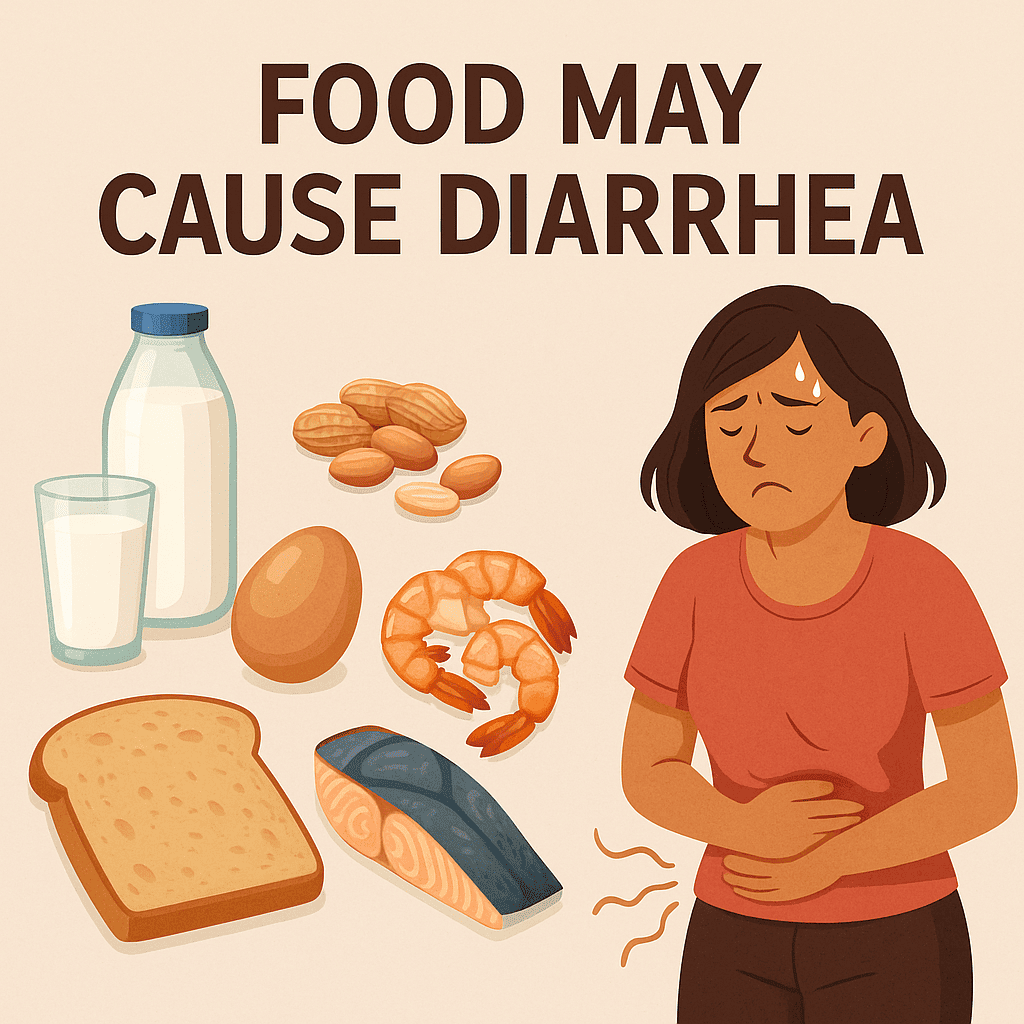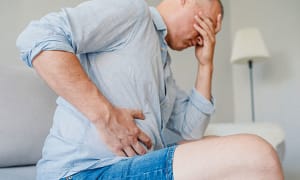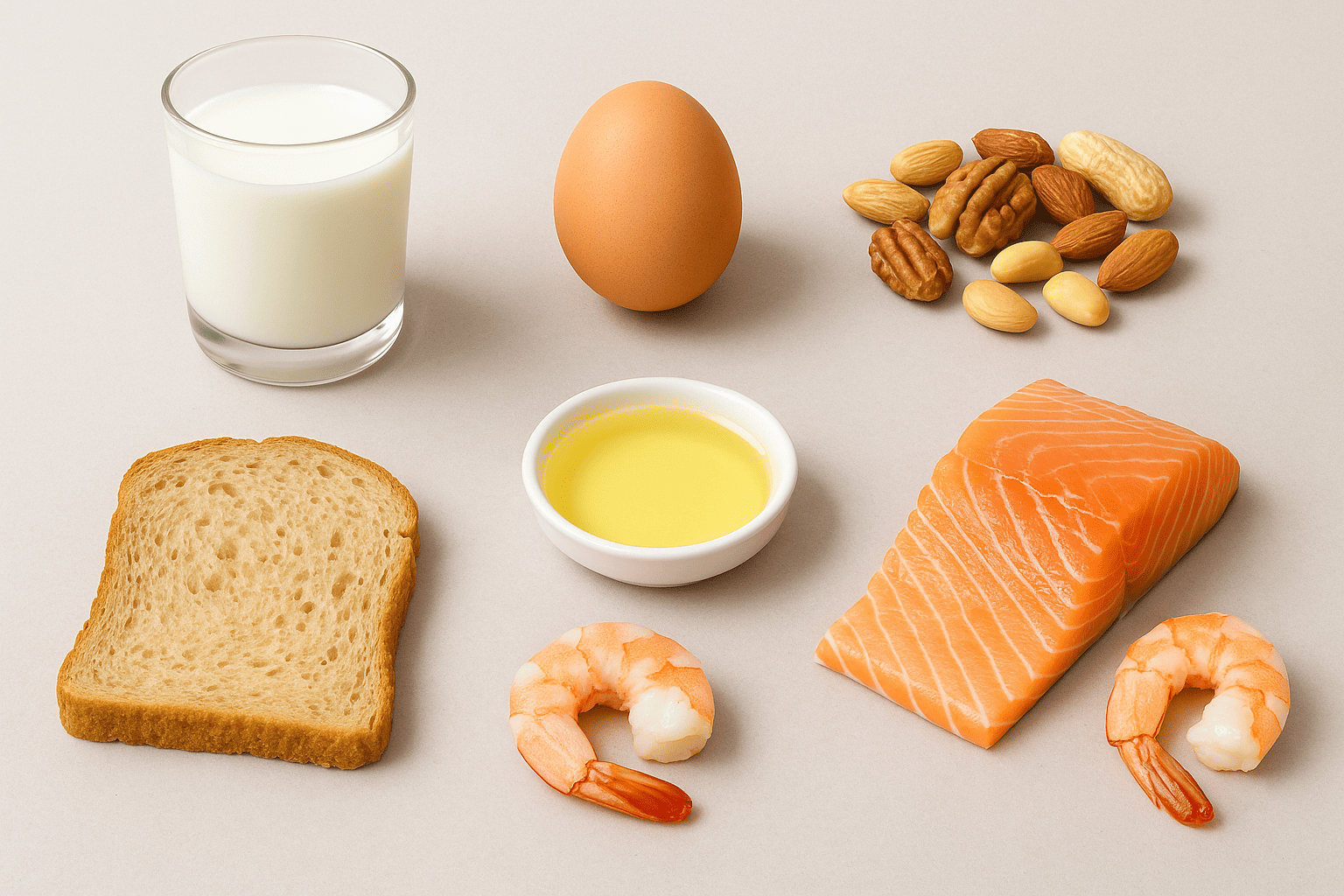Have you ever eaten a meal and then rushed to the bathroom soon after? It might not always be food poisoning or a random stomach bug. Sometimes, food allergies or food intolerances can cause diarrhea — and knowing the difference is important for your health.
In this guide, we’ll explain how food allergies and intolerances can trigger diarrhea, which foods are common culprits, and when you should see a doctor.
What Is Diarrhea?
Diarrhea is when your bowel movements become loose, watery, and happen more often than normal. It’s a common problem that usually goes away within a few days.
While occasional diarrhea is usually nothing serious, it can sometimes be a sign of something more — like an infection, food intolerance, or even a food allergy.
If diarrhea happens regularly after eating certain foods, it’s important to find out why and address it early (learn more from WebMD).
How Can Food Allergies Cause Diarrhea?
Food allergies happen when your immune system mistakenly identifies certain foods as harmful and overreacts. This immune reaction can affect the skin, respiratory system, and digestive system — causing symptoms like cramps, bloating, and diarrhea.
Diarrhea linked to food allergies often develops because the immune system triggers inflammation in the intestines, disrupting normal digestion and fluid absorption (learn more from WebMD).
In some cases, what feels like simple “stomach flu” could actually be an allergic reaction to something you ate (What Types of Food Allergens Can Trigger Allergies?).
Common Foods That Can Trigger Diarrhea
Not every case of diarrhea is caused by food allergies, but certain foods are known to be frequent triggers for digestive upset, especially in sensitive individuals.
Here are the most common culprits:
-
Milk and dairy (lactose intolerance and milk allergy)
-
Eggs
-
Peanuts and tree nuts
-
Wheat and gluten
-
Soy
-
Seafood (fish and shellfish)
People who react to additives like preservatives, dyes, and artificial sweeteners may also experience diarrhea after eating processed foods .
It’s important to differentiate between a true allergy and a food intolerance:
| Food Allergy | Food Intolerance | |
|---|---|---|
| Reaction | Immune system overreaction | Difficulty digesting food |
| Symptoms | Rash, hives, swelling, diarrhea, cramps | Bloating, gas, diarrhea |
| Danger | Can be life-threatening (anaphylaxis) | Usually uncomfortable, but not life-threatening |
(What are Food Allergies, and Is It Dangerous?)
Signs That Diarrhea Might Be Allergy-Related
If your diarrhea is caused by an allergic reaction rather than an infection or food poisoning, you might notice these signs:
-
It happens soon after eating a particular food.
-
You also experience skin rashes, itchiness, or swelling.
-
You have other allergic symptoms like runny nose or sneezing.
-
You experience diarrhea consistently with the same foods.
-
Other symptoms like headaches, cramps, and nausea may appear.
Dr. Maha Al-Najjar, a therapeutic nutrition expert, explains that allergic diarrhea may be confused with food poisoning but usually recurs with specific triggers. In her view, cramps, diarrhea, and headaches should always raise suspicion of a hidden food allergy.
When to See a Doctor
Not every case of diarrhea needs a doctor. But you should get medical help if:
-
Diarrhea lasts more than two days.
-
You have blood in your stool.
-
You experience severe dehydration symptoms (dry mouth, dark urine, dizziness) (CDC dehydration info).
-
You are unable to eat or drink without worsening symptoms.
Your doctor may recommend allergy testing to determine if a food allergy is behind your symptoms.
How to Manage Allergy-Related Diarrhea
Managing diarrhea caused by food allergies involves two major steps:
1. Identify and Avoid Trigger Foods
Keep a food and symptom diary to track what you eat and how your body reacts. Eliminate suspected foods one by one and monitor your symptoms.
Learn how to detect and manage food allergies before symptoms get worse.
2. Stay Hydrated and Treat Symptoms
Drink plenty of fluids like water and electrolyte solutions to replace what you lose. Avoid sugary drinks or caffeine, which can worsen diarrhea.
You can also explore natural remedies for mild allergy symptoms to soothe the gut and immune system naturally.
Final Thoughts
Yes, food allergies can definitely cause diarrhea, along with other uncomfortable symptoms. While occasional diarrhea may not be alarming, persistent or severe reactions after eating should never be ignored.
Understanding the link between food allergies and digestive issues empowers you to take control of your health.
If you suspect your diarrhea is food-related, don’t hesitate to seek a diagnosis and customize your diet accordingly. Small changes can make a huge difference!
📌 Quick FAQ
✅ Can food intolerance cause diarrhea too?
Yes! Food intolerances (like lactose intolerance) can also cause diarrhea, but they don’t involve the immune system like allergies do.
✅ Is diarrhea from food allergy dangerous?
If accompanied by severe allergic symptoms (swelling, breathing difficulty), it can be life-threatening. Immediate medical care is necessary.
✅ How can I find out which food is causing diarrhea?
Keep a detailed food diary, eliminate suspected foods one at a time, and consider getting tested for food allergies.



